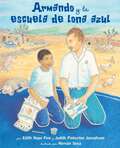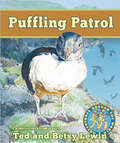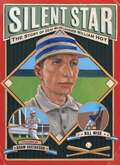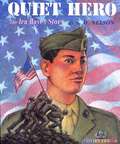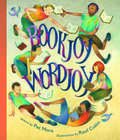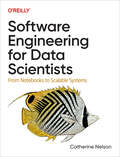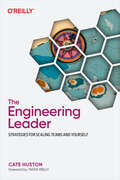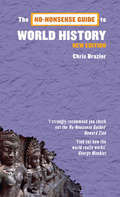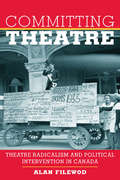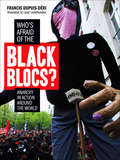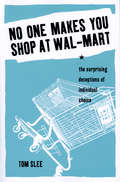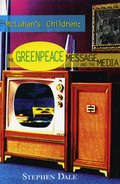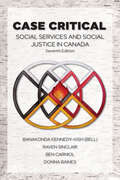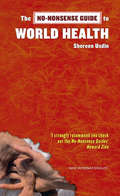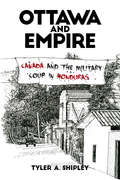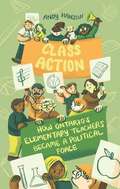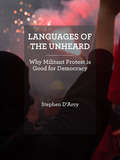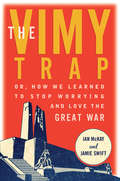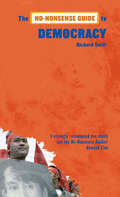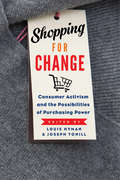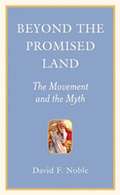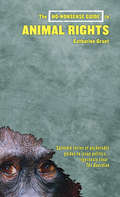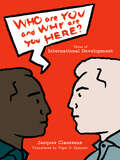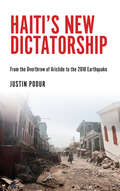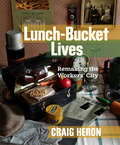- Table View
- List View
Armando y la escuela de lona azul: Armando And The Blue Tarp School
by Edith Hope Fine Judith JosephsonIn Spanish. The story of a young Mexican boy living in a colonia (trash dump community) who takes the first steps toward realizing his dream of getting an education.Buh-beep! Buh-beep! A truck horn sounds through Armando's colonia, his neighborhood, near the city dump. Señor David is back, setting up school on a blue tarp spread on the ground. Oh how Armando longs to go to this school, but he knows he must help his father pick through trash in the dump for things his family can use, recycle, or sell. When Armando's parents decide at last to let him spend afternoons at Señor David's school, Armando is overjoyed. He'll learn to read and write. He'll learn numbers. Best of all, he'll draw pictures. And one momentous day Armando's love of drawing helps bring an almost unimaginable treasure to the children of the colonia. Translated from Armando and the Blue Tarp School, Armando y la escuala de lona azul is a testament to the pursuit of dreams and the power of one person to make a difference in the lives of others.
Puffling Patrol (Adventures Around the World)
by Ted Lewin Betsy LewinTed and Betsy Lewin travel to Iceland to learn about the "Puffling Patrol," a group of children who rescue lost puffins and return them to sea.Every April, the Westman Islands off the coast of Iceland become home to hundreds of thousands of puffins, small black-and-white seabirds with colorful bills. They spend the summer on the rocky cliffs of the islands, caring for their newly hatched chicks. By the middle of August, it is time for the young puffins, called pufflings, to make their way to the sea. And that is when the children of The Puffling Patrol are called to action. Ted and Betsy Lewin have journeyed to the Westman Islands to experience The Puffling Patrol's endeavors firsthand. In the company of Erna, Dáni, and their father, they drive through town at night, carefully searching for confused little birds that have glided down onto the streets instead of out to sea. Will the children find the pufflings before the birds encounter danger? Will the pufflings ever make it to the sea to spend their lives with other puffins in the North Atlantic Ocean? The fascinating story of this unique annual rescue, combined with Ted Lewin's dramatic paintings and Betsy Lewin's lively field sketches, is sure to make Puffling Patrol a hit with animal lovers of all ages.
Silent Star: The Story of Deaf Major Leaguer William Hoy
by William WiseThe biography of William Ellsworth Hoy, the first deaf player to have a successful career in professional and Major League baseball.William Hoy loved baseball. Growing up in the 1860s and '70s, he dreamed of one day playing in the major leagues. A far-off fantasy for many boys, fulfilling this dream was even more of a long shot for William, who was deaf. Striving to find his place in a hearing world, Hoy became a shoemaker. He took pride in his work, but baseball was still his real love. When an amateur team coach saw him playing behind the shoemaker's shop, Hoy dazzled the coach with his hard-hitting skills. Moving from amateur clubs to the minor leagues and eventually to the majors, Hoy proved himself again and again-overcoming obstacles and becoming a star both on and off the baseball diamond. Silent Star: The Story of Deaf Major Leaguer William Hoy is a tribute to one of the most inspirational figures in baseball history. A talented player with a standout record, Hoy is a shining example that success in life should not be measured by differences but by drive and determination.
Quiet Hero: The Ira Hayes Story
by S. D. NelsonA biography of Ira Hayes, a Pima Indian who was one of the six soldiers to raise the United States flag on Iwo Jima during World War II, an event immortalized by Joe Rosenthal's Pulitzer Prize-winning photograph.Growing up on the Gila River Indian Reservation in Arizona, Ira Hayes was a quiet, shy boy. He never wanted to be the center of attention, and at school, he felt lonely and out of place. By the time Ira was in his late teens, World War II was raging. When the United States called its men to arms, Ira answered by joining the Marine Corps. He believed it was his duty to fight honorably for his country, and with his Marine buddies by his side, Ira finally felt as if he belonged. Eventually they were sent to the tiny Japanese island of Iwo Jima, where a chance event and an extraordinary photograph catapulted Ira to national awareness and transformed his life forever. Filled with all the patriotism and tragedy of wartime and its afteraffects, Quiet Hero is the story of one person's courage in the face of both military and personal battles. It is a poignant tribute to Ira Hayes.
Bookjoy, Wordjoy
by Pat MoraAn inspiring collection of Pat Mora's own glorious poems celebrating a love of words and all the ways we use and interact with them: reading, speaking, writing, and singing.Whether we are collecting words, reading favorite books in the library, celebrating holidays, writing poems, sharing secrets, or singing a jazzy duet, words and books can take us on wonderful adventures and bring us joy. Poet Pat Mora has brought together a collection of her poems that celebrates engaging with words and books in all these ways and more. Vivid illustrations by Raúl Colón bring the poems to life and interpret the magic of the language with captivating images in a style influenced by Mexican muralists. Together the poems and illustrations are sure to inspire creative wordplay in readers of all ages. We can read, you and I,see letters become words,and words become books ...You and I read, round and round,bookjoy around the world.
Software Engineering for Data Scientists
by Catherine NelsonData science happens in code. The ability to write reproducible, robust, scaleable code is key to a data science project's success—and is absolutely essential for those working with production code. This practical book bridges the gap between data science and software engineering,and clearly explains how to apply the best practices from software engineering to data science.Examples are provided in Python, drawn from popular packages such as NumPy and pandas. If you want to write better data science code, this guide covers the essential topics that are often missing from introductory data science or coding classes, including how to:Understand data structures and object-oriented programmingClearly and skillfully document your codePackage and share your codeIntegrate data science code with a larger code baseLearn how to write APIsCreate secure codeApply best practices to common tasks such as testing, error handling, and loggingWork more effectively with software engineersWrite more efficient, maintainable, and robust code in PythonPut your data science projects into productionAnd more
The Engineering Leader
by Cate HustonGreat engineers don't necessarily make great leaders—at least, not without a lot of work. Finding your path to becoming a strong leader is often fraught with challenges. It's not easy to figure out how to be strategic, successful, and considerate while also being firm. Whether you're on the management or individual contributor track, you need to develop strong leadership skills.This practical book shows you how to become a well-rounded and resilient engineering leader.Understand what it means to be the driving force behind your careerLearn how to self-manage and avoid the pitfalls that many newer managers faceEstablish evolving practices and structures to best scale your teamDefine the impact of your team and its core mission and values
No-Nonsense Guide to World History, 3rd edition (No-Nonsense Guides #30)
by Chris BrazierWho was the first black queen? How much do you know about China’s history? Most people’s knowledge of world history is hazy and incomplete at best. This updated No-Nonsense Guide gives a full picture, revealing the hidden histories and communities left out of conventional textbooks – from the civilizations of Africa, Asia and Latin America to the history of women. This updated and revised edition of one of the best-selling No-Nonsense Guides includes a new chapter from the perspective of the end of the first decade of the 21st century and includes material on the financial crisis and the world response to climate change. A perfect read for someone who wants to embrace the whole of history, rather than disconnected dynasties and events–all in one slim volume.
Committing Theatre: Theatre Radicalism and Political Intervention in Canada
by Alan FilewodCommitting Theatre offers the first full-length historical study of political intervention theatre and theatrical spectatorship in English Canada. Building on twenty years of research and engagement in the field, this book’s historical narrative frames close-up examples of how theatre artists have intervened in and engaged with political struggle from the mid-19th century to the present. Lumber-camp mock trials, Mayday parades and street protests, the Workers Theatre Movement, agitprop theatre, the counter-culture theatre of the 1960s and 1970s, and more recent anarchist theatre collectives all played a role in a vibrant and unique radical theatre culture that went largely unnoticed, unrecorded, and undocumented by the professional theatre establishment.
Who’s Afraid of the Black Blocs?: Anarchy In Action Around The World
by Francis Dupuis-DériFaces masked, dressed in black, and forcefully attacking the symbols of capitalism, Black Blocs have been transformed into an anti-globalization media spectacle. But the popular image of the window-smashing thug hides a complex reality. Francis Dupuis-Déri outlines the origin of this phenomenon, its dynamics, and its goals, arguing that the use of violence always takes place in an ethical and strategic context. Translated into English for the first time and completely revised and updated to include the most recent Black Bloc actions at protests in Greece, Germany, Canada, and England, and the Bloc’s role in the Occupy movement and the Quebec student strike, Black Blocs lays out a comprehensive view of the Black Bloc tactic and locates it within the anarchist tradition of direct action. We acknowledge the financial support of the Government of Canada through the National Translation Program for Book Publishing, an initiative of the Roadmap for Canada’s Official Languages 2013-2018: Education, Immigration, Communities, for our translation activities.
No One Makes You Shop at Wal-Mart: The Surprising Deceptions of Individual Choice
by Tom SleeWe live in a culture of choice. But, in an age of corporate dominance, our freedom to choose has taken on new meaning. Upset with your local big box store? Object to unfair hiring practices at your neighbourhood fast food restaurant? Want to protest the opening of that new multinational coffeeshop? Vote with your feet! What if it’s not that simple? In No One Makes You Shop at Wal-Mart, Tom Slee unpacks the implications of our fervent belief in the power of choice. Pointing out that individual choice has become the lynchpin of a neoconservative corporate ideology he calls MarketThink, he urges us to re-examine our assumptions. Slee makes use of game theory to argue that individual choice is not inherently bad. Nor is it the societal fix-all that our corporations and governments claim it is. A spirited treatise, this book will make you think about choice in a whole new way.
McLuhan’s Children: The Greenpeace Message and the Media
by Stephen DaleMcLuhan’s Children is an inside look at Greenpeace’s rise to global prominence through its savvy use of mass media imagery. From the flamboyant, guerilla-theatre approach to the emergence of environmentalism as a dominant international issue.
Case Critical: Social Services and Social Justice in Canada
by Banakonda Kennedy-Kish (Bell) Raven Sinclair Ben Carniol Donna BainesThis latest edition of Case Critical applies decolonized, critical analysis to highlight what is often hidden from view for most Canadians: the personal trauma and communal devastation inflicted on Indigenous people by past and present colonialism and the ways in which neoliberal tax cuts, austerity, and privatization create more inequality, homelessness, and despair among both Indigenous and non-Indigenous people. Social service providers, the authors argue, should become social activists, working in solidarity with progressive grassroots social movements in order to de-legitimatize colonial and neoliberal policies. Looking for the PDF of Table 5.1: Social Work Skills in Social Services (2017)? Download it under “Extras”.
No-Nonsense Guide to World Health (No-Nonsense Guides #29)
by Shereen UsdinHere is a clear, wide-ranging introduction to the worldwide state of human health. Starting with a brief history of modern medical progress, Shereen Usdin then untangles the knot created by poverty and globalization to show that where you live, how wealthy you are, and your gender all have a bearing on the diseases you may encounter in your lifetime—and your prospects for prevention, treatment, and ultimately, survival. Pulling no punches, Usdin also blows the whistle on the political economy of illness and how keeping people sick means more money for the pharmaceutical, tobacco, and food industries. This No-Nonsense Guide is a must-read for anyone who wants a clear sense of how healthy our global family really is.
Ottawa and Empire: Canada and the Military Coup in Honduras
by Tyler ShipleyIn June 2009, the democratically elected president of Honduras was kidnapped and whisked out of the country while the military and business elite consolidated a coup d’etat. To the surprise of many, Canada implicitly supported the coup and assisted the coup leaders in consolidating their control over the country. Since the coup, Canada has increased its presence in Honduras, even while the country has been plunged into a human rights catastrophe, highlighted by the assassination of prominent Indigenous activist Berta Cáceres in 2016. Drawing from the Honduran experience, Ottawa and Empire makes it clear that Canada has emerged as an imperial power in the 21st century.
Class Action: How Ontario’s Elementary Teachers Became a Political Force
by Andy HansonIn this inspiring history of a union, labour historian Andy Hanson delves deep into the Elementary Teachers’ Federation of Ontario (ETFO) and how it evolved from two deeply divided unions to one of the province’s most united and powerful voices for educators. Today’s teacher is under constant pressure to raise students’ test scores, while the rise of neoliberalism in Canada has systematically stripped our education system of funding and support. But educators have been fighting back with decades of fierce labour action, from a landmark province-wide strike in the 1970s, to record-breaking front-line organizing against the Harris government and the Common Sense Revolution, to present-day picket lines and bargaining tables. Hanson follows the making of elementary teachers in Ontario as a distinct class of white-collar, public-sector workers who awoke in the last quarter of the twentieth century to the power of their collective strength.
Languages of the Unheard: Why Militant Protest is Good for Democracy
by Stephen D'Arcy“What we must see,” Martin Luther King once insisted, “is that a riot is the language of the unheard.” In this new era of global protest and popular revolt, Languages of the Unheard draws on King’s insight to address a timely and controversial topic: the ethics and politics of militant resistance. Using vivid examples from the history of militancy—including armed actions by Weatherman and the Red Brigades, the LA Riots, the Zapatista uprising, the Mohawk land defence at Kanesatake, the Black Blocs at summit protests, the occupations of Tahrir Square and Zuccotti Park, the Indigenous occupation of Alcatraz, the Quebec Student Strike, and many more—this book will be of interest to democratic theorists and moral philosophers, and practically useful for protest militants attempting to grapple with the moral ambiguities and political dilemmas unique to their distinctive position.
The Vimy Trap: or, How We Learned To Stop Worrying and Love the Great War
by Ian McKay Jamie SwiftThe story of the bloody 1917 Battle of Vimy Ridge is, according to many of today’s tellings, a heroic founding moment for Canada. This noble, birth-of-a-nation narrative is regularly applied to the Great War in general. Yet this mythical tale is rather new. “Vimyism”— today’s official story of glorious, martial patriotism—contrasts sharply with the complex ways in which veterans, artists, clerics, and even politicians who had supported the war interpreted its meaning over the decades. Was the Great War a futile imperial debacle? A proud, nation-building milestone? Contending Great War memories have helped to shape how later wars were imagined. The Vimy Trap provides a powerful probe of commemoration cultures. This subtle, fast-paced work of public history—combining scholarly insight with sharp-eyed journalism, and based on primary sources and school textbooks, battlefield visits and war art—explains both how and why peace and war remain contested terrain in ever-changing landscapes of Canadian memory.
No-Nonsense Guide to Democracy, 2nd edition (No-Nonsense Guides #5)
by Richard SwiftIn this updated edition of the No-Nonsense Guide to Democracy, Richard Swift explores how democracy has been constricted and deformed by economic power-brokers and a self-serving political class from Birmingham to Bangalore. The book includes chapter-length discussions of topics such as the economic meltdown, Barack Obama, eco-democracy, democratizing the economy, and democracy in the Global South. It is not only a guide to the rich diversity of forms of elected government, but it also contains practical ideas for empowering today’s voters around the world.
Shopping for Change: Consumer Activism and the Possibilities of Purchasing Power (G - Reference, Information and Interdisciplinary Subjects)
by Louis Hyman and Joseph TohillConsuming with a conscience is one of the fastest growing forms of political participation worldwide. Every day we make decisions about how to spend our money and, for the socially conscious, these decisions matter. Political consumers “buy green” for the environment or they “buy pink” to combat breast cancer. They boycott Taco Bell to support migrant workers or Burger King to save the rainforest. But can we overcome the limitations of consumer identity, the conservative pull of consumer choice, co-optation by corporate marketers, and other pitfalls of consumer activism in order to marshal the possibilities of consumer power? Can we, quite literally, shop for change? Shopping for Change brings together historical and contemporary perspectives of academics and activists to show readers what has been possible for consumer activists in the past and what might be possible for today’s consumer activists.
Beyond the Promised Land: The Movement and the Myth (Provocations #1)
by David F. NobleIconoclast David F. Noble traces the evolution and eclipse of the biblical mythology of the Promised Land, the foundational story of Western Culture. Part impassioned manifesto, part masterful survey of opposed philosophical and economic schools, Beyond the Promised Land brings into focus the twisted template of the Western imagination and its faith-based market economy. From the first recorded versions of “the promise” saga in ancient Babylon, to the Zapatistas’ rejection of promises never kept, Noble explores the connections between Judeo-Christian belief and corporate globalization. Inspiration for activists and students alike.
No-Nonsense Guide to Animal Rights (No-Nonsense Guides #1)
by Catharine GrantThe protection of animal rights is more than a modern, western phenomenon. In fact, there is a long history of concern for animals around the world, and it is this concern that underlies today’s animal rights movement. The No-Nonsense Guide to Animal Rights explains the key issues, charts the growth of the movement, looks at welfare and protection laws, and makes connections between animal rights and other justice struggles. A practical day-to-day guide is included to help readers understand what they can do to minimize the exploitation of animals.
Who Are You and Why Are You Here?: Tales of International Development
by Jacques ClaessensEvery international development project looks good on paper until someone asks, “Who are you and why are you here?” In this case, it’s a man from northern Burkina Faso. His question reveals everything wrong with international development work today. Jacques Claessens questions the real effects of development programs and agencies, NGOs, and multinational corporations on the economy and welfare of the global south—from a Kafkaesque well-drilling project in Udathen to the Chernobyl-like environmental devastation wrought by the Canadian-owned Essakane mine. Through tales of uneasy encounters between nomadic Tuaregs and Western engineers, well-meaning NGO staff and their incredibly self-serving bosses, UN bureaucrats, a greedy Canadian mining company, and Burkinabe villagers–all pursuing ostensibly noble goals, all barely listening to each other–we begin to understand the realities of international development.
Haiti’s New Dictatorship: The Coup, the Earthquake and the UN Occupation
by Justin PodurIn 1804 Haiti became the world’s first independent Black republic following a slave revolution. Two hundred years later, ravaged by colonialism and corrupt elites, it was placed under a UN military occupation. Haiti’s New Dictatorship is the history of the past seven years, from the 2004 coup against Aristide to the devastating 2010 earthquake,revealing a shocking story of abuse and neglect by international forces. Justin Podur reveals the reality of a supposedly benign international occupation, arguing that the denial of sovereignty is the fundamental cause of Haiti’s problems. A powerful challenge and wake-up call to the international NGO and development community, Haiti’s New Dictatorship is essential reading for anyone concerned with justice in the global south and progressive development policies.
Lunch-Bucket Lives: Remaking the Workers’ City
by Craig HeronLunch-Bucket Lives takes the reader on a bumpy ride through the history of Hamilton’s working people from the 1890s to the 1930s. It ambles along city streets, peers through kitchen doors and factory windows, marches up the steps of churches and fraternal halls, slips into saloons and dance halls, pauses to hear political speeches, and, above all, listens for the stories of men, women, youths, and children from families where people relied mainly on wages to survive. Heron takes wage-earning as a central element in working-class life, but also looks beyond the workplace into the households and neighbourhoods—settlement patterns and housing, marriage, child care, domestic labour, public health, schooling, charity and social work, popular culture, gender identities, ethnicity and ethnic conflict, and politics in various forms—presenting a comprehensive view of working-class life in the first half of the twentieth century. This book has been published with the help of a grant from the Federation for the Humanities and Social Sciences, through the Awards to Scholarly Publications Program, using funds provided by the Social Sciences and Humanities Research Council of Canada.
